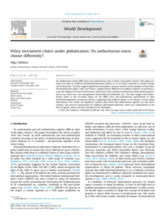Highlights:
- New data show policy convergence among 15 ex-Soviet states in childcare deinstitutionalization.
- Countries adopted policies as ‘a package’ (goals + instruments), as promoted by international actors.
- Authoritarian states adopted the same policy instruments, as non-authoritarian states.
- Authoritarian states adopted ‘modern’, non-coercive policy instruments, based on the agentic individual.
- World culture and international advocacy appear key to childcare policy instrument choice.
Abstract:
Do authoritarian states differ from non-authoritarian ones in their social policy choices? The paper presents new data on childcare deinstitutionalization policies in 15 ex-Soviet countries in Eastern Europe and Central Asia. The data suggest significant convergence among countries in the adoption of both deinstitutionalization policy ‘ends’ and ‘means’, despite drastic differences in political regimes.
In particular, the author traces the adoption of several instruments, which have been actively promoted by international organizations (e.g., foster care, case management, downsizing of institutions, etc.). The data suggest that authoritarian states in the ex-Soviet region do not differ from non-authoritarian governments in their deinstitutionalization instrument choices, suggesting that political regime is not always a major policy determinant.
The results are significant because they show that authoritarian regimes can also select modern, non-coercive instruments for childcare deinstitutionalization, which are underpinned by the idea of agentic actors and the centrality of the individual.
See related article:

